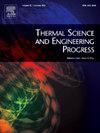带直接蒸发饱和器的燃气轮机发电厂的性能
IF 5.1
3区 工程技术
Q2 ENERGY & FUELS
引用次数: 0
摘要
提高燃气轮机发电厂性能的一种方法是在压缩空气(来自压缩机)进入燃烧室之前使用饱和器使其饱和。事实上,使用空气饱和器有可能增加燃烧室内的热焓,从而最终提高燃气轮机的整体性能。本研究建议采用直接蒸发冷却器 (DEC) 作为饱和器,即 GT 设备的 DES。本研究使用工程方程求解器 (EES) 软件编程开发了一个分析模型,通过敏感性分析和案例研究,研究了 DES 对 GT 发电厂性能的总体影响。研究表明,提高 DES 系统的进气温度和水温可显著提高燃气轮机的性能。研究结果表明,与没有饱和器的燃气轮机相比,使用 DES 可使燃气轮机的功率输出和热效率提高 7%。如果通过热回收系统 (HRS) 回收部分废热,并将其用于预热进入 DES 的压缩空气和水,则可实现这一改进。如果只分别提高饱和器入口水或空气的温度,则可分别提高约 6% 和 4%。本文章由计算机程序翻译,如有差异,请以英文原文为准。
Performances of a gas turbine power plant with a direct evaporative saturator
One way to improve the performance of gas turbine power plants is to saturate the compressed air (from the compressor) before it enters the combustion chamber, using a saturator. Indeed, utilization of an air saturator has the potential to augment the enthalpy within the combustion chamber, which may ultimately lead to an enhancement in the overall performance of the gas turbine. A direct evaporative cooler (DEC) is proposed as the saturator, i.e. DES for the GT plant in this study. The impact of the DES on the performance of the GT power plant has been studied in general through a sensitivity analysis and specifically through a case study, using an analytical model developed in this study and programmed in Engineering Equation Solver (EES) software. It has been demonstrated that increasing the inlet air and water temperatures in a DES system can lead to a notable enhancement in the performance of a gas turbine. The findings of the study indicated that the utilization of a DES could result in an increase of up to 7 % in power output and thermal efficiency of the GT in comparison to a gas turbine that does not possess a saturator. This improvement is achievable if waste heat is partially recovered through a heat recovery system (HRS) and employed for the purpose of preheating both the compressed air and water that are entering the DES. This improvement is approximately 6 % and 4 % respectively, if only the saturator inlet water or air temperatures were increased separately.
求助全文
通过发布文献求助,成功后即可免费获取论文全文。
去求助
来源期刊

Thermal Science and Engineering Progress
Chemical Engineering-Fluid Flow and Transfer Processes
CiteScore
7.20
自引率
10.40%
发文量
327
审稿时长
41 days
期刊介绍:
Thermal Science and Engineering Progress (TSEP) publishes original, high-quality research articles that span activities ranging from fundamental scientific research and discussion of the more controversial thermodynamic theories, to developments in thermal engineering that are in many instances examples of the way scientists and engineers are addressing the challenges facing a growing population – smart cities and global warming – maximising thermodynamic efficiencies and minimising all heat losses. It is intended that these will be of current relevance and interest to industry, academia and other practitioners. It is evident that many specialised journals in thermal and, to some extent, in fluid disciplines tend to focus on topics that can be classified as fundamental in nature, or are ‘applied’ and near-market. Thermal Science and Engineering Progress will bridge the gap between these two areas, allowing authors to make an easy choice, should they or a journal editor feel that their papers are ‘out of scope’ when considering other journals. The range of topics covered by Thermal Science and Engineering Progress addresses the rapid rate of development being made in thermal transfer processes as they affect traditional fields, and important growth in the topical research areas of aerospace, thermal biological and medical systems, electronics and nano-technologies, renewable energy systems, food production (including agriculture), and the need to minimise man-made thermal impacts on climate change. Review articles on appropriate topics for TSEP are encouraged, although until TSEP is fully established, these will be limited in number. Before submitting such articles, please contact one of the Editors, or a member of the Editorial Advisory Board with an outline of your proposal and your expertise in the area of your review.
 求助内容:
求助内容: 应助结果提醒方式:
应助结果提醒方式:


